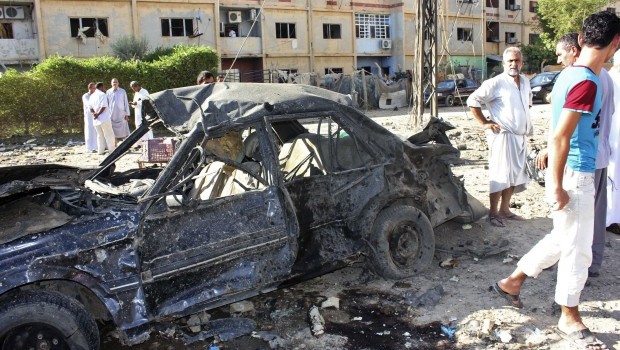
Civilians gather at the site of a bomb attack in Baquba, about 30 miles (50 kilometers) northeast of Baghdad, on August 26, 2013. Car bombs, roadside bombs and shootings killed at least 47 people in Iraq on Sunday, police and medical sources said. (REUTERS/Mohammed Adnan)
The move follows months of escalating terrorist attacks that have killed thousands of Iraqis. The tribal Sahwa forces were originally militias formed with some American assistance to combat extremist groups linked to Al-Qaeda, but were subsequently sidelined by the Iraqi government.
Qais Al-Shadhar, head of the justice, accountability and conciliation committee of the Iraqi Parliament and member of the Iraqi List, said: “When the Sahwa forces were formed in 2006, the Iraqi government failed to meet promises agreed with this important sector of society, which played a great part in fighting terrorism.”
However, Sami Al-Khazraji, commander of the Sahwa forces in the tense and multi-ethnic Diyala Province, said: “The distinguished success achieved by the Diyala Sahwa forces, despite the ferocious attacks, were the incentive and the main reason for the Iraqi government to seek the help of tribal men in other areas of Iraq where Sahwa forces were formed.”
The prime minister’s adviser for national reconciliation affairs, Amer Al-Khuzaie, said in a statement to the French news agency AFP that “Sahwa forces have scored many victories against Al-Qaeda, and on this basis, we have thought about reforming them, especially given that they [Al-Qaeda] have started to appear in protests.”
He added that “the new forces will be more organized and will receive more training. They will have a specific age groups, not more than 40 years-old.” Khuzaie said Al-Qaeda “has found a way to reappear through the protests . . . and, therefore, we have decided to provide support for the tribes again in the tense areas, in Mosul, Kirkuk, Diyala and around Baghdad.”
An official speaking on the condition of anonymity said that this step, which comes in parallel with the launch of an Iraqi military operation, is the biggest since the withdrawal of the American forces at the end of 2011, and will involve the enlistment of 10,000 new fighters to join the Sahwa forces, which currently have 44,000 men.
A senior military officer speaking on the condition of anonymity confirmed that the training of 2,000 new recruits had started at training centers of the interior and defense ministries, adding that “a number of these started active duty in some areas which witness repeated violent attacks north of Baghdad.”
For his part, commander of the Diyala Sahwa forces, Sami Al-Khazraji, told Asharq Al-Awsat that “the Sahwa forces’ men, mainly in Diyala, but in other areas as well, have played a great role in instilling security, which the security forces would have been unable to do.” He added that “despite the negative parts of our work, such as low and delayed pay, not activating the procedures of integration into either the security forces or the state institutions, despite all that, we still look at our work as a service to our people and the people of our regions.”
Khazraji said the reason for the government’s current interest in the Sahwas and why they want to form more of them was due to “the significant role we played in Diyala, because our commitment to our work as Sahwa men was better than the security forces’ commitment, and our information about the terrorists was better than what the security forces had, and because we live in the same area, we knew the individual terrorists.” He added that “officials may have appreciated our efforts, but the attention they gave us was not equal to our achievements.”
Shadhar said: “The experiment of Sahwas was very successful despite the mistakes. Some of the mistakes were deliberate on the part of some parties, and some were administrative. But we could not keep to our commitments as a government and as a parliament.” He added that “the agreement stipulated that 20 percent of the Sahwa forces would be integrated into the security forces and 80 percent into state institutions according to their qualifications or social standing, which did not go according to plan.”
Shadhar added that “the deterioration in security brought the Sahwa issue to the fore, and this means we still badly need them, and makes it important that we admit our past mistakes and deal with them.”
In the meantime, the chairman of the Sons of Iraq group, Sheikh Mohammed El-Hayes, told Asharq Al-Awsat that “the Sahwas and the Sons of Iraq are an experience that has proven to be greatly needed because of terrorism, especially in the tense provinces such as Anbar, Diyala and Mosul. They use methods which are not easy for the security and intelligence departments to follow in order to attain information, like we can as tribal people. This is because we know who is a stranger and who is not.”
He added that “we played a very important intelligence role in the operations carried out by the military forces in Anbar desert in the past, which led to great success and the arrest of a large number of terrorists, and the uncovering of plans, arms and hideouts.”
